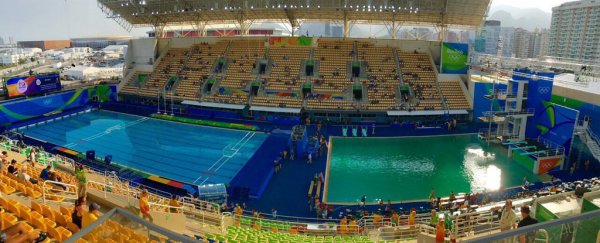The water in the diving pool at the Rio Olympics turned bright green on Tuesday, baffling competitors and fans, and embarrassing officials who were at a loss to explain the abrupt colour change.
Bizarrely, the diving pool water appeared perfectly blue and clear for the competition on Monday, but divers scheduled to compete in the women's synchronised 10-metre platform final the next day found that their pool had turned a dark, murky green overnight.
What makes the spectacle all the more crazy is that the neighbouring water polo pool in the Maria Lenk Aquatic Centre remains a crystal clear blue, making for a ridiculous-looking contrast between the two pools, which are only a few metres apart, as you can see in the image below.
Ermmm...what happened?! pic.twitter.com/pdta7EpP2k
— Tom Daley (@TomDaley1994) August 9, 2016
While competitors for the most part didn't seem too bothered by the phenomenon, it would have been impossible for anybody not to notice the change.
"When we were practising to get used to this venue (the water) was always sky blue," China's Liu Huixia, who won gold with diving partner Chen Ruolin, told media. "But we're always mentally prepared for unexpected situations."
"It's pretty green. It's so green," said American diver Jessica Parratto. "I don't know why. [We] got a personal best score so maybe we should ask for a green pool from now on. I kind of liked it."
And of course, some competitors had a more amused take on the appearance of the green water.
"Wait is someone playing a joke or are we celebrating St Patty's Day early here in Rio?" tweeted American men's diver David Boudia, who picked up a silver medal on Monday night, before the water made its green transformation.
Wait is someone playing a joke or are we celebrating St Patty's Day early here in Rio? #divingpond #Olympics pic.twitter.com/CsxxperHvM
— David Boudia (@davidboudia) August 9, 2016
While Olympics officials in Rio have assured the public that the dark green water doesn't pose a risk to the athletes who have to swim in it, they've not been able to explain what's behind the sudden colour change.
"To ensure a high quality field of play is mandatory to Rio 2016 committee," organisers said in a statement. "Water tests at Maria Lenk Aquatics Centre diving pool were conducted and it was found to be no risk to athletes' health. We are investigating what are the causes of the situation but are pleased to say the competition was successfully completed."
We're yet to hear an official explanation, but experts are saying there are a couple of possible causes, likely stemming from a faulty filter, or otherwise problematic water quality, as the executive director of swimming's world governing body FINA told Reuters.
"No danger for divers, just not a good image for Olympic Broadcasting Services," he said, adding that it wasn't clear how quickly the pool's water could be returned to its usual appearance.
If a filter isn't working properly, or if a pool isn't getting enough chlorine, algae can bloom in the water, changing its colour to that dark hue of green you can see in the images.
"Algae blooms can be sparked by changes in a pool's chlorine level, and a common way to avoid this is to use chlorine shock overnight to kill any algae in the pool," explains Darren Orf at Gizmodo. "If that's the case, someone is going to get fired."
Another possible cause might be oxidised copper, like the kind you see on outdoor statues that turn green over time after being exposed to water. The question then becomes how would copper get into the pool in the first place?
As Brian Resnick at Vox explains, it's possible for this to happen when the pool's water comes into contact with corrosion in copper heaters.
Rio officials say they'll explain the cause of the green water once they've had a chance to investigate it more thoroughly, and until that happens, we won't know for sure.
But it's definitely not a good look for an Olympics that has already come under fire for the quality and safety of its water outdoors – and now it seems even the treated pools in indoor venues aren't entirely safe.
